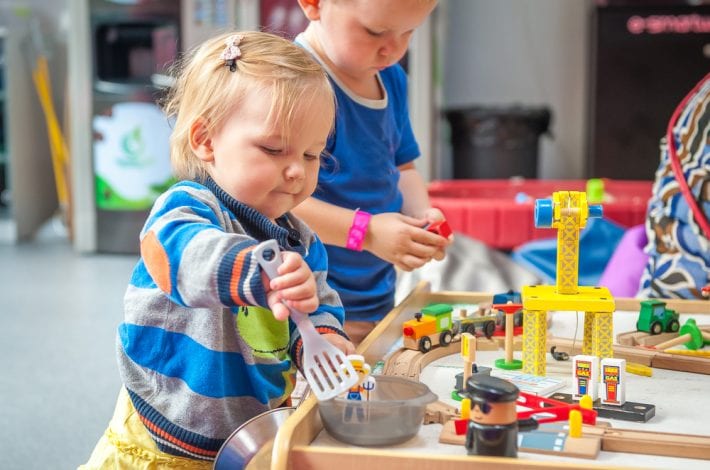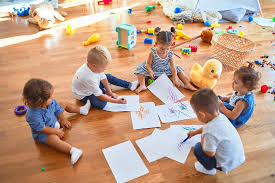Transitioning to nursery school is a significant step for both children and parents. While it marks the beginning of a child’s formal education journey, it also comes with its set of apprehensions and uncertainties. Proper preparation can make this transition smoother, ensuring that your child starts this new phase with enthusiasm and confidence. Here’s how you can get your child excited little one ready for nursery school:
1. Cultivate a Positive Attitude:
Talk about starting nursery school in an upbeat manner. Share stories of your school days or read children’s books about going to school. A positive attitude from parents often rubs off on children, making them more eager to start.
2. Establish a Routine:
Nursery schools have a structured routine. Try to emulate this at home by setting regular meal, play, and nap times for most children. A few weeks before school starts, adjust your child’s bedtime to ensure they get enough rest and wake up refreshed.
3. Visit the School:
Most schools offer orientation days. Attend these with your child. Let them explore the environment, meet the teachers, and maybe even make a few new friends too. Familiarity can reduce first-day jitters.
4. Work on Independence:
Nursery school requires a certain level of independence. Teach your child to manage basic tasks like washing hands, using the restroom, or wearing shoes. It’s also essential to assure them that it’s okay to ask for help when needed.
5. Encourage Social Skills:
Arrange playdates or attend community events where your child can interact with peers. Fostering skills like sharing, taking turns, and basic communication with younger children can make their nursery school experience more fulfilling.
6. Discuss the School Routine:
Talk about the school day’s structure — from the time they’ll be dropped off, to spend time and activities they’ll engage in, to the time you’ll pick them up. This can make the unknown feel more predictable for them.
7. Shop for School Supplies Together:
Let your child pick out their backpack, lunch box, or water bottle. This not only gives them a sense of responsibility but also builds excitement about using these items in school.
8. Address Concerns:
It’s natural for your child to have concerns or fears. Listen to them, validate their feelings, and provide comfort. Avoid dismissing their feelings or comparing them with other kids.
9. Set Goodbye Rituals:
Parting with family members can be the toughest part. Establish a quick and loving goodbye ritual, like a hug followed by a high-five. Long, drawn-out farewells can make the separation harder.
10. Stay Connected:
Some schools offer apps or communication tools that keep parents updated about their child’s day. Engage with these tools and discuss the day’s activities with your child, reinforcing what they learned all the fun activities.
Child’s Nursery School
A child’s nursery school is a pivotal stage in their early education and development. It provides a safe and nurturing environment where children between the ages of 3 and 5 can embark on their educational journey.
What is a Nursery School?
Nursery school, also known as preschool or pre-K in some regions, is an early childhood education institution where children learn through play and structured activities. Typically, children between the ages of 3 and 5 attend nursery schools. These establishments focus on social, physical, and intellectual development, preparing children for the next steps in their educational journey.
Benefits of Nursery School:
- Social Skills Development: Interaction with peers helps children develop essential social skills, like sharing, turn-taking, and empathy.
- Introduction to Structure: Nursery schools introduce kids to a structured environment, helping them adapt to routines.
- Foundation for Learning: Through play and guided activities, children get a foundation in language, math, and general knowledge.
- Emotional Development: By being apart from primary caregivers, children learn to be independent and manage their emotions.
- Physical Development: Regular activities and playtime aid in refining motor skills.
Selecting the Right Nursery School:
- Know Your Priorities: Decide what’s crucial – proximity to home/work, curriculum style, class size, or other factors.
- Research: Look for schools in your area, read reviews, and ask for recommendations from friends or family.
- Visit the School: Schedule a tour to get a feel of the environment. Observe the teacher-student interactions, the safety measures, and the available facilities.
- Curriculum & Teaching Philosophy: Understand the school’s teaching methodology. Some schools may follow Montessori, Waldorf, or traditional methods.
- Staff Qualifications: Ensure that the staff is qualified and has undergone background checks. The teacher-student ratio is also essential for individualized attention.
- Safety: Check for safety measures, cleanliness, and emergency protocols.
- Feedback & Communication: A good school will regularly update parents about their child’s progress and any incidents.
- Cost: While you shouldn’t compromise on quality, ensure the school fits within your budget. Also, inquire about any hidden fees or additional costs.
- Flexibility: Check if the school offers part-time schedules or extended hours if required.
- Inclusivity: Ensure that the school promotes an inclusive environment, respecting diversity in all forms.
Preparing for the First Day:
- Talk About It: Discuss the new routine with your child. Reading books about starting school can also help.
- Visit the School: Familiarity can reduce anxiety. Attend orientation days or visit the school a couple of times before the first day.
- Set a Routine: Establish a bedtime and morning routine a few weeks in advance.
- Stay Positive: Children can pick up on parental anxiety. Stay positive and reassure your child.
- Goodbye Ritual: Establish a quick goodbye ritual to make drop-offs smoother.
Other Children Both You
Interactions with other children are not just about fun activities about play; they’re about building essential life skills. By fostering and guiding these interactions, parents and caregivers can ensure that children develop into empathetic, understanding, and socially adept individuals. Always remember that each child is unique, and while some may be naturally social, others might need a gentle push. Respect their pace and comfort while gently nudging them towards positive interactions.
The Significance of Interactions with Other Children:
- Social Skills Development: Interacting with other children teaches kids about sharing, compromise, turn-taking, and conflict resolution.
- Emotional Growth: By playing and communicating with peers, children learn to recognize and manage their own emotions, as well as understand those of others.
- Cultural Awareness: Interacting with children from diverse backgrounds can foster tolerance, acceptance, and a broader understanding of various cultures and traditions.
- Language Development: Conversations with peers can expand vocabulary, improve speech, and enhance conversation skills.
- Cognitive Growth: Group activities or play can introduce new concepts and challenge a child’s way of thinking, promoting cognitive development.
- Empathy Building: By understanding and respecting the feelings and perspectives of other children, kids can develop empathy.
- Preparation for Future: Engaging with peers prepares children for future scenarios, like school settings or collaborative environments.
Promoting Positive Interaction with Other Children:
- Playdates: Arrange regular playdates with peers. This could be with neighborhood children, school friends, or relatives of a similar age.
- Join Groups or Clubs: Enrolling children in sports teams, dance classes, art clubs, or other group activities can give them a chance to interact with others.
- Model Behavior: Children often imitate adults. Model positive social interactions and behaviors for them to replicate.
- Teach Conflict Resolution: Equip children with tools and strategies to resolve disputes, emphasizing communication and understanding.
- Encourage Group Activities: Board games, team sports, or collaborative art projects can teach teamwork and mutual respect.
- Set Boundaries: While promoting interaction, also set boundaries about acceptable behavior. This can prevent bullying or other negative interactions.
- Discuss & Reflect: After playdates or group activities, talk to your child about their experiences. Discuss any challenges faced and the fun moments they enjoyed.
Language skills
Language skills are fundamental to effective communication, understanding, and expression. These skills encompass a broad range of abilities, from understanding spoken and written language to expressing thoughts, ideas, and emotions.
Components of Language Skills:
- Listening (Receptive Language): The ability to understand spoken language. It involves interpreting the sounds one hears into meaningful messages.
- Speaking (Expressive Language): The ability to use words and sounds to express oneself.
- Reading: Recognizing and understanding written words and sentences.
- Writing: Composing text to convey meaning.
- Grammar & Syntax: Understanding and applying the rules that govern the structure of sentences.
- Vocabulary: Knowing and correctly using a broad range of words.
- Pronunciation: Producing sounds or words correctly.
- Pragmatics: Understanding the social rules of communication, like how to take turns in a conversation or how to adjust tone depending on the audience.
Importance of Language Skills:
- Communication: Language is the primary medium through which we communicate. Effective language skills allow us to share and receive information.
- Cognitive Development: Language skills play a crucial role in cognitive development, influencing how we perceive and interact with the world.
- Academic Success: Mastery of language skills is essential for reading comprehension, written expression, and general academic achievement.
- Career Opportunities: In many professions, strong language skills, especially in reading and writing, are vital.
- Social Interaction: Effective language skills help in understanding social cues, making connections, and maintaining relationships.
Enhancing Language Skills:
- Read Regularly: Whether it’s books, newspapers, or magazines, reading enhances vocabulary, comprehension, and grammar.
- Engage in Conversations: Speaking with others helps refine speaking and listening skills.
- Take Classes: Consider language classes, workshops, or online courses.
- Write Daily: Journaling, writing essays, or even composing emails can improve writing abilities.
- Play Language Games: Games like Scrabble, Boggle, or crossword puzzles can enhance vocabulary.
- Listen to Music or Podcasts: This is especially beneficial when learning a new language. It helps with pronunciation and understanding.
- Join Discussion Groups: Engaging in group discussions can enhance listening skills and the ability to express thoughts clearly.
- Hire a Tutor or Language Partner: Personalized attention can address specific areas of improvement.
- Travel: Immersing oneself in an environment where the target language is spoken can rapidly improve language skills.
- Use Technology: Apps like Duolingo, Babbel, or Rosetta Stone offer structured language learning platforms.
Preparing your child for nursery school is a collaborative journey. With patience, understanding, and some preparation, you can ensure that your child’s introduction to formal education is positive and enjoyable. Remember, every child is unique, and what works for one might not work for another child prepare yours. Stay attuned to your child’s needs, and they’ll soon look forward to their school days with eagerness and curiosity.




Recent Comments